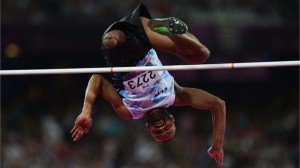 Once again the Olympic Games are upon us. For 16 days the Olympics will be on the world stage, so we can turn on our TVs and see the footage all day long. Like many other families, my family will be watching the events that most interest us. I enjoy the Olympic Games and have incredible admiration for the amazing talent, hard work and dedication of the athletes. They deserve all the attention the Olympic Games give them, however no more than the amazing Paralympic athletes.
Once again the Olympic Games are upon us. For 16 days the Olympics will be on the world stage, so we can turn on our TVs and see the footage all day long. Like many other families, my family will be watching the events that most interest us. I enjoy the Olympic Games and have incredible admiration for the amazing talent, hard work and dedication of the athletes. They deserve all the attention the Olympic Games give them, however no more than the amazing Paralympic athletes.
I recently read an article written by Rachelle Friedman entitled 8 Misconceptions About Life With Paralysis. In the article Rachelle discusses the common misconceptions that people have about being paralyzed. While I am not paralyzed and not even trying to imagine what her life is like, nor compare Rachelle’s circumstances to mine, her story made me stop and think about the misconceptions people have about disabilities in general. I certainly can attest to the misconceptions people have about life on a pair of crutches. The misconceptions come from a lack of understanding, experience or exposure to what it is like to live with a disability. Life without a disability can be challenging enough, making it very difficult for people to imagine what it would be like to not have the use of a part of their body. What they would discover, put in many of our circumstances, is that the human body can adapt and the parts that are still usable compensate for the damaged ones. Indeed, my body has adapted to using my arms to aid in walking. Recently while at Disney my wife and a few of the cast members observed that I was using my arms to swing my body in and out of all the rides. They commented on how easy and graceful I made it look. I no longer have to think about it; my arms just compensate for my leg.
The number one misconception people have of my situation is that getting around on crutches is a miserable and torturous chore that renders me immobile. For me using crutches has become habitual, and in contrast to what people think they actually provide me with mobility and independence.
The second misconception of my situation is that I am unable to engage in any sport or  physical activity, including walking a city block. Hell, for the most part people assume I need help getting on and off an elevator. In conversation, if I bring up something about walking, biking, working out or skiing, the response is one of shock that I can do these things. Yes, my left leg is basically a painfully appendage that no longer serves me in walking, however I have found adaptive ways of living my daily life which includes participating in recreational activities.
physical activity, including walking a city block. Hell, for the most part people assume I need help getting on and off an elevator. In conversation, if I bring up something about walking, biking, working out or skiing, the response is one of shock that I can do these things. Yes, my left leg is basically a painfully appendage that no longer serves me in walking, however I have found adaptive ways of living my daily life which includes participating in recreational activities.
With the Olympics upon us I have to wonder how many people actually have any idea what the Paralympics are, and if they do what misconceptions they have about these athletes. The Paralympics is the second largest national sporting event, preceded only by the Olympics. The Paralympics offer many of the same events the Olympics do and the focus is 100% on the sports, not the disabilities. I believe the Paralympics are a perfect opportunity to educate the world that a disability doesn’t mean incapability.
The Paralympics first came about in 1948. They were not called the Paralympics and were originally started as a sports competition for World War II veterans who had spinal cord related injuries. The Paralympics did not become open to anyone other than wheelchair athletes until the first winter games in Ornskoldsvik, Sweden, in 1976. This was the first time the games were open to multiple categories of athletes with disabilities. Today the Paralympic categories include amputee, cerebral palsy, intellectual disability, wheelchair, visually impaired, and athletes with disabilities that do not fall into the other five categories.
The actual term ‘Paralympics’ was first used in 1988, in the summer games in Seoul, South Korea. The term derives from the Greek preposition “para”, which means “beside” or “alongside” and refers to the fact that the competition was held in parallel with the Olympic Games. After the summer games in 1988 the Paralympics have taken place in the same city as the Olympics and take place following the closing ceremonies of the Olympic Games.
The Paralympics give incredible athletes the chance to compete and excel in their category of sport. Without the Paralympics many of these athletes would not have the opportunity to compete – not because of ability, but due to their disability, logistics of the game being played and the adaptive method being used. It would create an unfair disadvantage among the athletes. However, depending on the athlete’s disability many do have the ability to compete with “able bodied” athletes in the Olympic Games. Athletes with disabilities can participate in the Olympics as long as they meet criteria set out by sport governing bodies. Athletes who have a disability and compete in the Olympic Games is not unheard of. Just to name a few, George Eyser was a gymnast with a prosthetic leg and competed in the 1904 Olympic Games. A right-arm amputee Karoly Takes competed in shooting events in 1948 and 1958, and Natalia Partyka, born without a lower right arm, competed in the Beijing Olympics in 2008. Most notably Oscar Pistorius, a double below knee amputee, sprinted in the London Summer Games. In an ideal world I would like to see the athletes with disabilities and the able-bodied athletes all competing in the Olympic Games. Not competing against each other of course, but essentially combining the events of both the Olympics and Paralympics into just the Olympics. This would not only put the “able-bodied” athletes on the world stage but the “athletes with disabilities” as well. I do realize the magnitude of problems this would create, but imagine the impact these athletes with disabilities would have on the world if we saw them competing side by side with the Olympic athletes!
 The Paralympics Games are so inspiring to watch, yet the average person never sees even one event. Unfortunately the Paralympics do not get the sponsors the Olympics get, therefore do not get the TV coverage either. In the US the TV coverage of the Paralympics is almost nonexistent. To watch the Paralympics in the US you need to go to the Paralympic YouTube Channel http://www.youtube.com/user/ParalympicSportTV. In other countries such as Japan and the UK, TV coverage of the Paralympics is more prevalent. Without a specific interest in the Paralympics the average person will not log into YouTube to watch them, and therefore they will miss out on watching this incredible sporting event. If the Paralympics got the publicity and TV coverage the Olympics get, the world would be drawn to watching it and would realize what these athletes are capable of.
The Paralympics Games are so inspiring to watch, yet the average person never sees even one event. Unfortunately the Paralympics do not get the sponsors the Olympics get, therefore do not get the TV coverage either. In the US the TV coverage of the Paralympics is almost nonexistent. To watch the Paralympics in the US you need to go to the Paralympic YouTube Channel http://www.youtube.com/user/ParalympicSportTV. In other countries such as Japan and the UK, TV coverage of the Paralympics is more prevalent. Without a specific interest in the Paralympics the average person will not log into YouTube to watch them, and therefore they will miss out on watching this incredible sporting event. If the Paralympics got the publicity and TV coverage the Olympics get, the world would be drawn to watching it and would realize what these athletes are capable of.
The Paralympic Games serve as great testimony that people with a vast array of disabilities are extraordinarily capable people. These athletes certainly debunk the common misconceptions people have about being disabled. If we saw them competing in the Olympic Games or had the ability to easily tune in each night while the Paralympic games were being held, then the world would see the “ability” in the word “disability”. Perhaps then people would dismiss their misconceptions of what someone with a disability is capable of.
The Paralympic Games begin March 7th and last for 10 days
If you would like to watch the Paralympics with me and get inspired go to –
http://www.youtube.com/user/ParalympicSportTV
If you live in the UK –
If you live in Japan – http://www.paralympic.org/news/sky-perfect-shares-full-sochi-2014-broadcast-plans
References:
http://en.wikipedia.org/wiki/Paralympic_sports
http://www.olympic.org/content/olympic-games/paralympic-games/?tab=history



